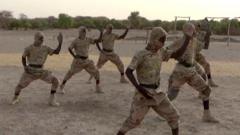As Ivory Coast approaches presidential elections, disinformation campaigns fueled by self-styled pan-Africanist influencers have sparked rumors of an alleged coup. Experts examine the motivations behind these misleading narratives and their repercussions in a politically charged climate strained by increasing tensions with neighboring Burkina Faso.
Disinformation in Ivory Coast: The Rise of Coup Rumors Amid Political Tensions

Disinformation in Ivory Coast: The Rise of Coup Rumors Amid Political Tensions
Recent false claims about a coup in Ivory Coast highlight the growing influence of pan-Africanist influencers and the spread of misinformation in West Africa.
In May, the streets of Abidjan, Ivory Coast's largest city, buzzed with unfounded reports of a coup, igniting fear and confusion both locally and among the diaspora. Individuals like Mafalda Marchioro were startled to wake up to text messages from worried friends abroad, all reacting to a torrent of online content proclaiming military takeover. Viral videos showcased soldiers supposedly taking action, while inaccurate narratives spread rapidly across platforms like YouTube.
However, the claims of a coup on 19 May turned out to be fabricated, further demonstrating the unsettling trend of disinformation campaigns based on political unrest in West Africa. As the nation gears up for crucial presidential elections later this year, experts note an increasing likelihood that disinformation efforts will target Ivorian politics, particularly focusing on President Alassane Ouattarra, who is expected to pursue a fourth term from a position viewed as pro-Western.
Ivory Coast's Communications Minister Amadou Coulibaly attributed these false reports to "neighbouring countries," pointing towards burgeoning tensions with Burkina Faso where self-proclaimed pan-Africanist influencers are gaining traction. These figures often promote anti-Western sentiments and glorify leaders like Burkina Faso's military ruler, Capt Ibrahim Traoré, whose actions have captured the youthful demographic across the continent eager for decisive leadership.
Alex Vines, director of the Africa Programme at Chatham House, explains how these influencers aim to destabilize existing political structures by amplifying coup rumors, preying on public disenchantment with current governance. With analysts drawing parallels between the current misinformation scene in Ivory Coast and past Russian-sponsored campaigns in the region, the origins of these narratives seem to reflect both regional animosities and a deliberate attempt to dismantle confidence in democratic institutions.
Social media has played a crucial role in disseminating these coup rumors. Notably, a pro-government activist in Burkina Faso, Harouna Sawadogo, initiated panic by inciting military action against the Ivorian government through videos shared with overwhelming success. Simultaneously, content creators across Nigeria, Kenya, and South Africa capitalized on these misleading claims, seeking greater engagement from audiences hungry for change.
Despite the chaos, some influencers—like Kenyan YouTuber Godfrey Otieno—have expressed regret for participating in the spread of false information, citing an awareness of debilitating effects on public sentiment. The comments section beneath such viral content often exudes enthusiasm for potential regime change, revealing underlying tensions and aspirations for supportive leadership across the continent.
As Ivory Coast's elections approach, the climate of fear and the proliferation of disinformation not only jeopardizes democratic processes but also represents a broader conversation about the future of governance in West Africa amid growing cries for pan-African unity and independence. While many of these influencers claim to champion pan-African ideals, experts caution that the tactic of spreading falsehoods undermines the very fabric of solidarity they profess to promote, exacerbating fears and anxieties as the political landscape remains precarious.





















